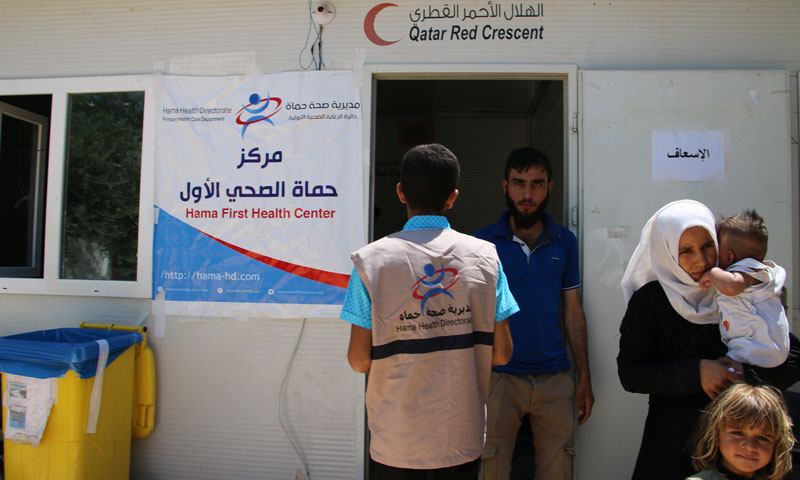Rural Hama – On the two levels of security and livelihood, the only persons left in rural Hama face major difficulties while the shelling and military confrontations continue, in addition to which the deterioration of the healthcare sector seems to enhance the dilemma of the area’s residents.
In the western and northern suburbs of Hama, 13 healthcare facilities are rendered out of service under the latest Russia-backed military campaign, which the Syrian regime launched against the opposition factions-held areas in Northern Syria, during which about 130 persons in Hama governorate fell dead, as the statistics of the Response Coordinators indicate.
The healthcare services in the area are today limited to first aid and a few surgical procedures, Ibrahim al-Shamali, a media personality of Free Hama Health Directorate told Enab Baladi, while the rest of the clinics have disappeared almost entirely.
The area’s dentistry clinics were among the first afflicted medical facilities, while very a few even before the military campaign. There is not a single dentist in rural Hama today, the recently displaced dentist Salem al-Sayed said.
The area bore witness to a displacement wave of more than 1500 persons, who escaped the northern and western parts of rural Hama to the safer areas in rural Idlib.
100-Kilometer-Journey to the Dentist
Al-Sayed pointed out that some of the area’s dentists have fled to different areas in Northern Syria; others have migrated. This situation, thus, forces those suffering a toothache to travel for 75 to 100 kilometers to reach dentists based in other areas.
Zakaria Ramadan, a man from the village of Qaber Fidda, rural Hama, has been enduring this pain since he left his home to southern rural Idlib, adjacent to northern rural Hama, for there is not a dentist who would continue the treatment of cavity and dental infections.
Zakaria spoke to Enab Baladi about his pain, for today he is dependent on pain killers and antibiotics to rid of the severe ache. “Earlier on, I used to be treated at the Sharia Healthcare Center. Today, there is not a doctor nor a healthcare center in rural Hama,” he added.
Part of Zakaria’s pain is attributed to the nature of the former treatment sessions, as they were limited to drilling or extraction of teeth, but not filling, as he put it.
Dentist Salem al-Sayed stressed that none of the organizations has sufficiently funded the dentistry centers before because their consumables are periodic, including the filling materials and others, which are usually costly as they are imported from Turkey.
The dentist added that some of the patients were used to receiving treatment at the free centers affiliated with the Hama Healthcare Directorate, and despite the fact that the treatment was restricted to extraction, drilling, filling and a few gum problems, they offered a solution to impoverished patients.
The dental laboratories were also almost nonexistent in rural Hama, al-Sayed said, adding that “due to the inability at obtaining consumables or special equipment. The high capacity laboratories are located far away, which forced patients to give up on the idea of certain treatments, such as [bridges or prostheses].”
Displaced Healthcare Services
The Hama Healthcare Directorate, affiliated with the former Syrian Interim Government, provided three dentistry clinics in the area, according to Ibrahim al-Shamali, a media personality of the Free Hama Healthcare Directorate, adding that the clinics, before they went out of service, used to provide services to a monthly 2000 beneficiaries.
The damage that affected the dentistry sector is part of the dilemma of the medical sector in rural Hama in general, for five hospitals, five first aid centers, three surgical units were targeted in the last military campaign, which caused their destruction and rendered them out of service, al-Shamali said.
The area was also a home to 48 specialized doctors, 14 resident doctors, and another 9 general doctors, who operated in the facilities of the healthcare directorate in rural Hama, under the first aid centers, specialized hospitals and the mobile clinics which spread in different locations in northern rural Hama and the western rural parts in al-Ghab Plain, as well as Kafr Zita, Kafr Nabudah, Ltamenah, in addition to a few areas in southern rural Idlib and the Shashabo Mountain.
Following the last military campaign, the Hama Healthcare Directorate and the Idlib Healthcare Directorate coordinated as to initiate healthcare posts in areas of displacement, according to al-Shamali.
In addition to this, five healthcare centers affiliated with the Hama healthcare Directorate and two specialized hospitals – Hospital 112 in the town of Harem and the Maternity Hospital in the town of Qah are offering services to about 200 thousand persons in the camps areas.

